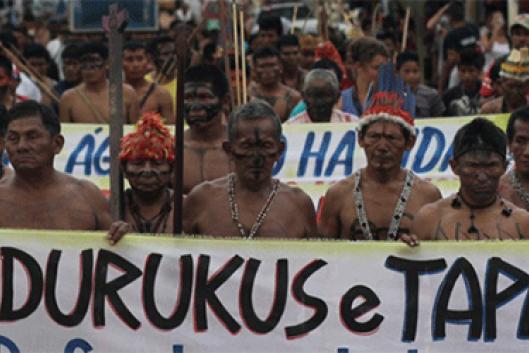In the history of the peoples who have been living in the Amazon since before the arrival of European colonizers, the invasion of their territories has been a constant fact of life. For the indigenous Mundukuru peoples, the most serious threat currently comes from the building of seven new hydropower dams: the Tapajós complex. Other threats come from the "garimpeiros" ('artisanal' gold miners), loggers, and even an overseas company which through a forest carbon (REDD) project wanted to take control of their territory. They opposed all these threats and are now mobilizing against yet another: three forestry concessions that the government intends to grant even though the Mundukuru are mobilizing to have their territorial rights recognized and have been carrying out self-demarcation of their territory.
The Mundukuru who live in the Tapajós River region are in a struggle for the formal recognition of their territory. Currently, one of the main frontiers in the struggle is the demarcation of the territory they have traditionally used and which is known as Sawré Muyby. The traditional occupation was confirmed in a report prepared by government technicians. Therefore, the federal government has a constitutional duty to formalize recognition of the territory without delay, so that the Mundukuru who live there have their future survival guaranteed.
But that same government has not complied with either national legislation or international treaties on indigenous rights. There is a very clear reason for its actions. The territory that the Mundukuru want to preserve for their children’s future falls within an area which will be seriously affected by the largest hydropower plant that the Brazilian government has planned for the coming years: the Tapajós hydropower complex. This hydropower complex would flood large areas of indigenous territory, making it impossible for the Munduruku to continue living there. The economic-financial interests behind this multi-billion dollar project, justified by the government as necessary for the "development" of the country, seek to prevail over the interests of the Mundukuru.
In 2014, in a clear attempt to intimidate the Mundukuru and suppress their resistance movement even further, the federal government announced it would auction forestry concessions in the national forests Itaituba I and II to private logging companies. The concept of forestry concessions is a relatively new instrument in Brazil introduced by the federal government. They promised not to repeat the same mistakes and problems that have been experienced in other countries, by ensuring they listen to local peoples, by introducing social and environmental guarantees, and bringing “development” to the region while maintaining forest conservation (1).
However, as the case of the Mundukuru demonstrates, implementation of the instrument of forestry concessions does not fulfill any of these promises. It appears to be applied mainly to attend to certain political and economic interests and in clear violation of these peoples' collective rights. In an open letter, the Mundukuru peoples ask, "Could government authorities and the federal justice system agree to hand out concessions that will destroy part of our native land? They confirm that villages are located near the border of concessions and that the forests that are to be logged are important to their people, for fishing, hunting and agriculture activities. (2)
The Public Federal Ministry (MPF) of Pará gave its support to the Mundukuru, taking legal action in March 2015 in which it calls on the Brazilian judiciary to suspend the tender which would grant logging concessions affecting the Mundukuru. The MPF argues that the “call for tender ignored information from its own management plan that states there are indigenous and non-indigenous families and archaeological sites in these areas.” The MPF also argues that “one of the omissions of the call for tender is the reference to the Sawré Muybu land management plan, land traditionally occupied by the indigenous Munduruku peoples. The process of demarcation of this particular area has been dragging on for 14 years and was paralyzed inexplicably in 2013, when almost all administrative procedures were already completed.” In another dispute with the Brazilian judiciary, the MPF requests that the federal government conclude the demarcation of this territory. (3)
Finally, it is important to remember that the federal government announcement that it would issue permits to exploit wood that would affect the Mundukuru was made shortly after the Mundukuru began self-demarcation of the Sawré Muyby territory. Tired of waiting for the federal government, they decided to organize and enter the forests and carry out the demarcation of the territory on their own. That tactic has been practiced by many indigenous peoples faced with government delays in ensuring their rights.
In an open letter, the Mundukuru write: “In the Tapajós region, while every day more and more forests are killed, loggers invade Reserves and National Parks, even on the land that we have been demarcating ourselves, and while there is an increase in the number of gold miners killing the Tapajos River, opposite the Amazon National Park, the government busies itself attacking the Munduruku, denying our right to traditional lands, rather than exercising its obligation to protect the environment which belongs to all Brazilians. If they think we're going to give up the fight for our land, for the protection of forests and of all beings living within them, the struggle for the future of our children, they are wrong. We remain united and strengthened by the wisdom of our shamans and “caciques” [traditional leaders], and by the union with nature and the spirits that the Karosakaybu [the Mundukuru gods] taught us” (4).
Watch the documentary "Munduruku: Weaving Resistance" in
112230009">
- http://www.ipam.org.br/uploads/conteudos/fbb5e4f19476726c709621762f95267d45216837.pdf.
- https://autodemarcacaonotapajos.wordpress.com/2014/11/24/carta-ii-da-autodemarcacao/
- http://www.prpa.mpf.mp.br/news/2015/mpf-pede-suspensao-da-concessao-das-florestas-nacionais-itaituba-i-e-ii
- https://autodemarcacaonotapajos.wordpress.com/2014/11/24/carta-ii-da-autodemarcacao/
